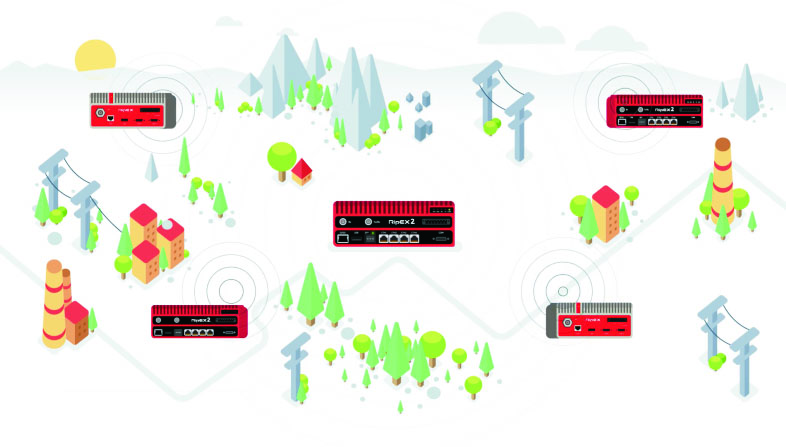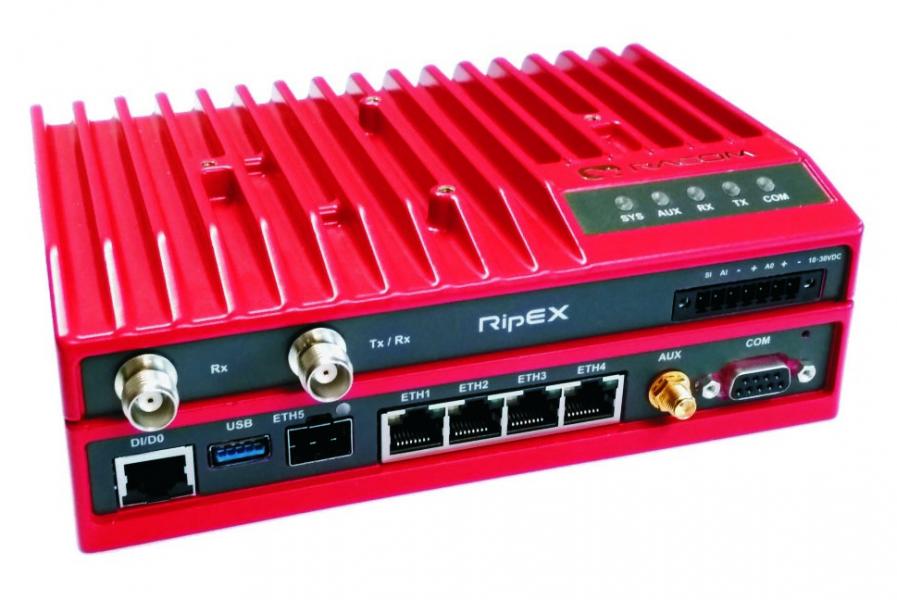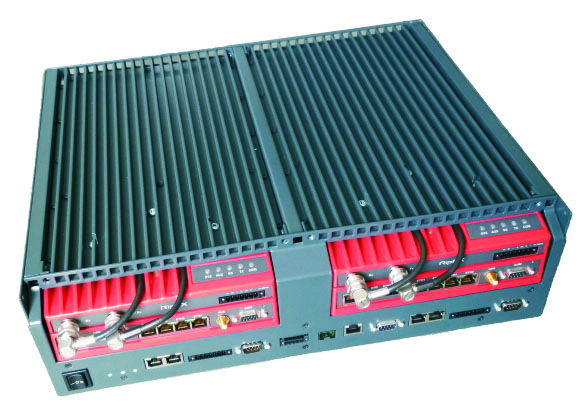RipEX Radio Modems
RipEX2
- 1.1 Mbps / 200 kHz / 256QAM
![RipEX2 - Rdiomodem RipEX2 - Rdiomodem]()
- 4× ETH, 1× SFP, 1× COM, 1× USB,
- RipEX compatible
- All RipEX features plus:
- 6.25 - 200 kHz channel size
- ACM, Adaptive FEC
- RADIUS
- HW tamper proof
- Expansion ready - mPCIe
- Full-duplex ready
RipEX is a radio modem platform renowned for overall data throughput in any real-time environment. RipEX radio modems are native IP devices, Software Defined with Linux OS that have been designed with attention to detail, performance and quality. All relevant state-of-the-art concepts have been carefully implemented.
RipEX, 1st generation, is a best-in-class compact radio modem proven within the market since 2011 and used in thousands of installations.
RipEX2, 2nd generation, was introduced in 2018. This more powerful standard radio modem provides significant improvements, especially in terms of data speed, security and number of interfaces.
RipEX-HS, a fully redundant 19’ hot-standby master station with two radios and two power supplies and available for both, RipEX and RipEX2, is the final member of the RipEX family.
All RipEX devices provide a 24/7 reliable service for mission-critical applications like SCADA & Telemetry for Electric and Water Utilities, Oil & Gas distribution and many other applications.
RipEX
- 166 kbps / 50 kHz / 16DEQAM
![RipEX Radio modem RipEX Radio modem]()
- 1× ETH, 2× COM, 1× USB
- Solar ready
- 0.1 – 10 watts
- - 40 to +70 °C
- WiFi management
- Customized protocols
- Backup routes
- Fast remote access
- IPsec
General overview
| RipEX | RipEX2 | |
| Max. Gross data rate | 166 kbps | 1.1 Mbps |
| Gross data rate / 25 kHz | 83 kbps | 167 kbps |
| Interfaces | 1x ETH, 2x COM, 1x USB | 4x ETH, 1x SFP, 1x COM, 1x USB |
| IPsec | Yes | Yes |
| RADIUS | No | Yes |
| Modulations | CPFSK - 16DEQAM | CPFSK - 256QAM |
| Channel size | 6.25 - 50 kHz | 6.25 - 200 kHz |
| Stream mode | Yes | No |

Native IP Device
Native IPBridge mode – uses a Transparent protocol on the Radio channel, i.e. packets received on any interface are broadcast to the respective interfaces on all units in the network. Packets received on COM are broadcast to all COM's at all remote sites, allowing you to connect more RTU's to each remote unit.
Router mode – RipEX works as a standard IP Router with all interfaces (Radio and 1-5 Ethernets) and 1-2 COM ports without any compromise. Each of the five Ethernet ports on RipEX2 can be configured either as a switch or a router. There is an option of two protocols on the Radio channel: Flexible – unlimited anti-collision meshing without base stations or Base driven where all packet transmissions are managed by the local base station.
- Switch – switched or routed Ethernet ports (RipEX2)
- Terminal server - Serial-Ethernet converters, 5 independent sessions
- TCP proxy - converts TCP to UDP, eliminates transfer of TCP overhead
- ARP proxy - any IP address simulating (for RTU's without routing capabilities within the same subnet)
- Subnets - unlimited number of virtual Ethernet interfaces (IP aliases)
- VLAN - unlimited number of VLANs assigned to Subnets
- NAPT - many IP addresses behind RipEX can be mapped to one RipEX IP
- GRE - non encrypted end-to-end tunnel
- QoS - prioritization of packets from different interfaces and/or applications on Radio channel
Data speed & Throughput
- Possible Network throughput is achieved by
- Min. Rx/Tx switching and synchronization times
- Optimum Radio protocol for the application
- Optimization
- payload data and headers compression
- packet flow optimization on Radio channel
- Different data speeds for individual links
- Auto-speed - receiver is automatically adjusted to the data
- rate of the incoming frame
- ACM and Adaptive FEC (RipEX2)
- Stream mode - transmitting starts immediately on the Radio channel, without waiting for the end of the received frame on COM => zero latency
| Channel size | Gross data rate | Possible Network throughput | ||
| RipEX | RipEX2 | RipEX | RipEX2 | |
| 6.25 kHz | 21 kbps | 42 kbps | > 25 kbps | > 50 kbps |
| 12.5 kHz | 42 kbps | 83 kbps | > 50 kbps | > 100 kbps |
| 25 kHz | 83 kbps | 167 kbps | > 100 kbps | > 200 kbps |
| 50 kHz | 167 kbps | 333 kbps | > 200 kbps | > 400 kbps |
| 100 kHz | - | 555 kbps | > 700 kbps | |
| 150 kHz | - | 925 kbps | > 1.1 Mbps | |
| 200 kHz | - | 1.1 Mbps | > 1.4 Mbps | |
Security & Integrity
- Licensed radio bands
- FEC, interleaving, proprietary data compression
- CRC32 data integrity control on Radio channel
- Proprietary protocol on Radio channel
- Backup routes
- Digitally signed FW (RipEX2)
- Management - https, ssh,
- Role-based access control
- AES256 encryption
- IPsec - encrypted end-to-end tunnel
- Firewall - Layer 2 – MAC, Layer 3 – IP, Layer 4 – TCP/UDP
Radio protocols
- Transparent / Bridge
- Repeater(s) supported
- No collision avoidance capability
- Flexible / Router
- Unlimited Tree topology
- Multi-polling and report-by-exception concurrently
- Nomadic mode - automatic routing
- Base driven / Router
- Star topology, repeaters supported
- Optimized for TCP/IP (IEC104)
- Fair distribution of channel capacity among all remotes
Long range
- One radio hop over 50 km
- Line of sight not required
- Carrier output power 0.1 - 10W
- Exceptional data sensitivity
- Any unit can work simultaneously as a repeater
- Unlimited number of repeaters on the way
- Any IP network can interconnect RipEX units
Reliability
- Units tested in a climatic chamber and in real traffic
- Heavy-duty industrial components
- Industrial rugged die-cast aluminium case
- IP40 or IP51
- -40 to +70 °C
- 3 year warranty
Easy to configure and maintain
- Web interface or CLI via SSH
- All configuration parameters within one page
- Wizards - fast and simple setup
- Non-intrusive management via USB using either ETH/USB adapter or WiFi/USB adapter with DHCP
- Fast remote access - only the effective data are transferred over the air, html page downloaded from the local unit
- External flash disc - automatic configuration, SW keys and FW upgrade
Diagnostics & Network Management
- Statistic logs for interfaces and communication links
- Historical and on-line values displayed in graphs
- 20 periods (e.g. days) of history
- Watched values (RSS, Ucc, Temp, PWR, etc.) also from neighbouring units
- SNMP v3 including Traps and Informs
- HW Alarm input, HW Alarm output
- Monitoring – on-line analysis of communication over any of the interfaces
Scalability
- SW feature keys
- Advance features only when and where needed
- Router, Speed, COM2, 10W, Backup routes, Master
- Free Master-key trial - for 30 days in every RipEX
- HW models
- The same HW for Base, Repeater or Remote stations
- Internal GPS module - NTP synchronization (RipEX)
- mPCIe slot for expansion boards (RipEX2) GPS, 4G, 2x RS232, DI/DO…
SCADA protocols
- Modbus, IEC101, DNP3, PR2000, Comli, DF1, Profibus, Async Link, C24, Cactus, RP570, Slip, Siemens 3964(R), IEC104, DNP3/TCP, Modbus TCP and others
- SCADA serial protocol addresses are mapped to RipEX addresses
- TCP(UDP) protocols can be handled transparently or using Terminal server or TCP proxy
- Embedded Modbus RTU / Modbus TCP converter
- Each packet is transferred as an acknowledged unicast
Backup routes
- Tested alternative paths between two RipEX units
- Automatic switch-over to backup gateway, if primary route fails due to packet loss or weak RSS
- Backup gateway can be behind Radio or Eth interfaces
- Unlimited number of Alternative paths
- Alternative path priority assignment
Energy savings
- Solar ready
- Sleep mode - wake up triggered by Sleep digital input or by internal RTC (RipEX2)
- Save mode - wake up by a received packet from Radio channel or by Sleep digital input
RipEX-HS
- Fully redundant hot-standby master station
![RipEX - HS RipEX - HS]()
- Fully monitored
- Automatic switchover capability on detection of failure
- Auto toggle mode periodically switches units regardless of failure
- Two booted-up standard RipEX units inside
- Switch-over time < 2 s
- Two independent power supplies
- One or two antenna connectors
- Hot swappabble
- 19″ rack 3U
Technical parameters
| Radio parameters | RipEX | RipEX2 |
| Frequency bands | 135–154; 154–174; 215-240; 300–320; 320–340; 340–360; 368–400; 400–432; 432–470; 470-512; 928–960 MHz | 400-470 |
| Channel spacing | 6.25 / 12.5 / 25 / 50 kHz | 6.25 / 12.5 / 25 / 50 / 100 / 150 / 200 kHz |
| Frequency stability | +/- 1.0 ppm | |
| Modulation | QAM (Linear): 16DEQAM, D8PSK, π/4DQPSK, DPSK FSK (Exponential): 4CPFSK, 2CPFSK | QAM (Linear): 256QAM, 64QAM, 16DEQAM, D8PSK, π/4DQPSK, DPSK FSK (Exponential): 4CPFSK, 2CPFSK |
| FEC (Forward Error Correction) | On/Off, 3/4 | On/Off, 2/3, 3/4, 5/6 |
| Gross data rate | up to 167 kbps | up to 1.1 Mbps |
| RF Output power | 0.1 to 10 W programmable | |
| Duty cycle | Continuous | |
| Rx to Tx Time | < 1.5 ms | |
| Sensitivity | - 99 dBm / 16DEQAM / 25 kHz -115 dBm / 2CPFSK / 25 kHz | - 93 dBm / 256QAM / 25 kHz -115 dBm / 2CPFSK / 25 kHz |
| Electrical | ||
| Primary power | 10 to 30 VDC, negative GND | |
| Rx | 5 W/13.8 V; 4.8 W/24 V; (Radio part < 2 W) | 8 W |
| Tx (dependent on RF power and modulation) | 13 – 40 W | 13 – 55 W |
| Sleep mode | 0.1 W | 0.01 W |
| Save mode | 2 W | 5 W |
| Interfaces | ||
| Ethernet | 1x 10/100 Base-T Auto MDI/MDIX / RJ45 | 4x 10/100 Base-T Auto MDI/MDIX / RJ45 |
| SFP | No | 1×10/100/1000 Base-T/1000Base-SX/1000Base-LX |
| COM 1 | RS232 / DB9F 300 – 115 200 bps | RS232/RS485 / DB9F 300 bps – 1 Mbps |
| COM 2 | RS232/RS485 SW configurable / DB9F 300 – 115 200 bps | mPCIe expansion board 2x RS232 |
| USB | USB 1.1 / Host A | USB 3.0 / Host A |
| Antenna | 1x TNC female / 50 ohms (Rx/Tx) or 2x TNC (Rx+Tx) - different HW model | 2x TNC female / 50 ohms SW configurable: 1x Rx/Tx or 1x Rx + 1x Tx |
| Inputs/Outputs | 1x HW alarm input, 1x HW alarm output, 1x Sleep input | 2x HW alarm input, 1x HW alarm output, 1x Sleep input |
| Indication LEDs | ||
| LED panel | Power, ETH, COM1, COM2, Rx, Tx, Status | SYS, AUX, RX, TX, COM |
| ETH | No | 4x RJ45 - 2x LED, 1x SFP - 1x LED |
| Environmental | ||
| IP Code (Ingress Protection) | IP40, IP51 | |
| MTBF (Mean Time Between Failure) | > 900.000 hours (> 100 years) | |
| Operating temperature | - 40 to +70 °C (- 40 to +158 °F) | |
| Operating humidity | 5 to 95% non-condensing | |
| Mechanical | ||
| Casing | Rugged die-cast aluminium | |
| Dimensions | 50 H x 150 W x 118 D mm (1.97 x 5.9 x 4.65 in) | 60 H x 185 W x 125 D x mm (2.34 x 7.2 x 4.9 in) |
| Weight | 1.1 kg (2.4 lbs) | 1.55 kg (3.4 lbs) |
| Mounting | DIN rail, L-bracket, Flat-bracket, 19″ Rack shelf | |
| SW | ||
| Operating modes | Bridge / Router | Bridge / Router (+Switch) |
| User protocols on COM | Modbus, IEC101, DNP3, PR2000, Comli, DF1, Profibus, Async Link, C24, Cactus, RP570, Slip, Siemens 3964(R)… | |
| User protocols on Ethernet | Modbus TCP, IEC104, DNP3 TCP, Comli TCP… | |
| Serial to IP convertors | Modbus RTU / Modbus TCP, DNP3 / DNP3 TCP, Terminal server | |
| Radio protocols | Transparent, Flexible, Base driven | |
| Multi master applications | Yes | |
| Report by exception | Yes | |
| Collision Avoidance Capability | Yes | |
| Remote to Remote communication | Yes | |
| Repeaters | Store-and-forward; Every unit; Unlimited number | |
| Optimization | Payload data and Ethernet / IP / TCP / UDP header compression, Packet flow on Radio channel optimization | |
| NTP (Network Time Protocol) | Client, Server (synchronized from internal GPS) | |
| Security | ||
| Management | HTTP, HTTPS (own certificate), SSH | |
| Access accounts | 2 levels (Guest, Admin) | 4 levels (Guest, Tech, SecTech, Admin) x 3 users |
| Encryption | AES256 | |
| IPsec | Yes | |
| RADIUS | No | Yes |
| Firewall | Layer 2 - MAC, Layer 3 - IP, Layer 4 - TCP/UDP | |
| HW tamper proof | No | Yes |
| Diagnostics and Management | ||
| Radio link testing | Yes (ping with RSS, Data Quality, Homogenity) | |
| Watched values | Device – Ucc, Temp, PWR, VSWR, HW Alarm Input Radio channel – RSScom, DQcom, TXLost [%] User interfaces – ETH [Rx/Tx], COM1 [Rx/Tx], COM2 [Rx/Tx] | |
| Statistics | For Rx/Tx Packets on User interfaces (ETH, COM1, COM2) User data and Radio protocol (Repeates, Lost, ACK etc.) on Radio channel | |
| Graphs | For Watched values and Statistics | |
| History (Statistics, Neighbours, Graphs) | 20 periods (configurable, e.g. days) | |
| SNMP | SNMPv1, SNMPv2c, SNMPv3, SNMP Traps for Watched values | |
| Approvals | CE (RED), FCC, ATEX, RoHS | Pending |
Video presentation RipEX radio modems



